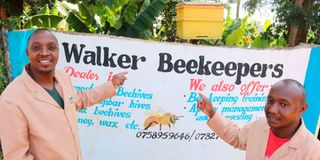When beehives transform lives

Walker Beekeepers, founders Martin Mwangi Muriuki and Samuel Muhindi. The venture later gave birth to Mukandima – a community based organisation.
Mukangu village in Kiine location on the Kirinyaga-Nyeri county border hosts Walker Beekeepers, an exemplary venture.
Walker Beekeepers, which started in 2019, is owned by Martin Mwangi Muriuki, 41, and his nephew Samuel Muhindi, 35.
It makes and sells hives. The two also educate Kenyans on beekeeping.
The area is known for coffee farming but the two men took the decision to utilise locally available resources to make an extra coin.
Locals grow maize, beans, potatoes and vegetables for subsistence.
“Coffee has a lot of flowers. We thought of having bees, which would then feed on the nectar and produce honey in return,” says Muriuki, the brains behind the project.
It started as an idea, which he shared with his nephew.
“It was after watching a you-tube video. Coffee self-pollinates but bees are of assistance,” Muriuki explains.
Their research involved farm visits in Nyeri and Kirinyaga counties.
Muriuki has taken short courses on bee keeping. He credits the National Bee Institute, Lenana, for Walker Beekeepers growth.
Muriuki and Muhindi began the venture with Sh50, 000.
The amount was from their savings. They also borrowed from friends and relatives.
“We made 10 hives and set them on the farm,” Muhindi says.
He adds that once one has the bees, it takes about six months to get the first harvest.
“Every hive produces five kilogrammes of honey. A kilo of raw honey goes for Sh400 to Sh600,” he says.
Locals curious on beekeeping motivated the two to involve the community in the enterprise.
Walker Beekeepers eventually gave birth to Mukandima – a Community Based Organisation.
“We diversified from getting honey alone to helping the society,” Muriuki says.
The CBO trains people on bee keeping. The training entails understanding bees, setting up hives, taking care of the insects, harvesting honey and advising on marketing.
Muriuki says local supply cannot meet the demand.
“Honey has never lacked market but Kenya’s production is way too low,” he says, adding that honey is known to combat many ailments, including coronavirus.
National Bee Institute official Victor Okoth says Kenya imports about 70 per cent of the honey consumed locally.
“We import from Tanzania, the Democratic Republic of Congo and Sudan,” the apiarist says, calling on Kenyans to embrace beekeeping.
Mukandima has three apiaries – a place or collection of hives and bees.
One is in Mukangu, with 30 hives, though it has a capacity of 120.
The others are in Rumuti, Laikipia County, with 58 hives and Baringo with 60.
“Mukangu has 32 members while Laikipia has four. We are still recruiting in Baringo,” Muhindi says.
To join the CBO, one is charged Sh200.
It targets jobless youth, widows and disabled people. After training, the organisation and well-wishers support the beneficiary with two hives and a tree seedling.
“We are environmentally conscious. Making hives requires timber. It is for this reason that we give every member a seedling for reforestation,” Muriuki, an International Business Administration Degree holder, says.
The two men attribute a reduction in suicides, alcoholism and drug abuse in Mukangu to Walker Beekeepers.
The poverty eradication programme has also seen domestic violence cases fall.
A non-member pays Sh2,000 to be trained in beekeeping.
“Building a hive costs Sh4,500,” says Muhindi, a Laboratory technician by training.
Establishing the workshop at Walker Beekeepers cost the two men Sh85,000.
The workshop makes the Kenya top bar, langstroth and box bee hives. It specialises in langstroth.





